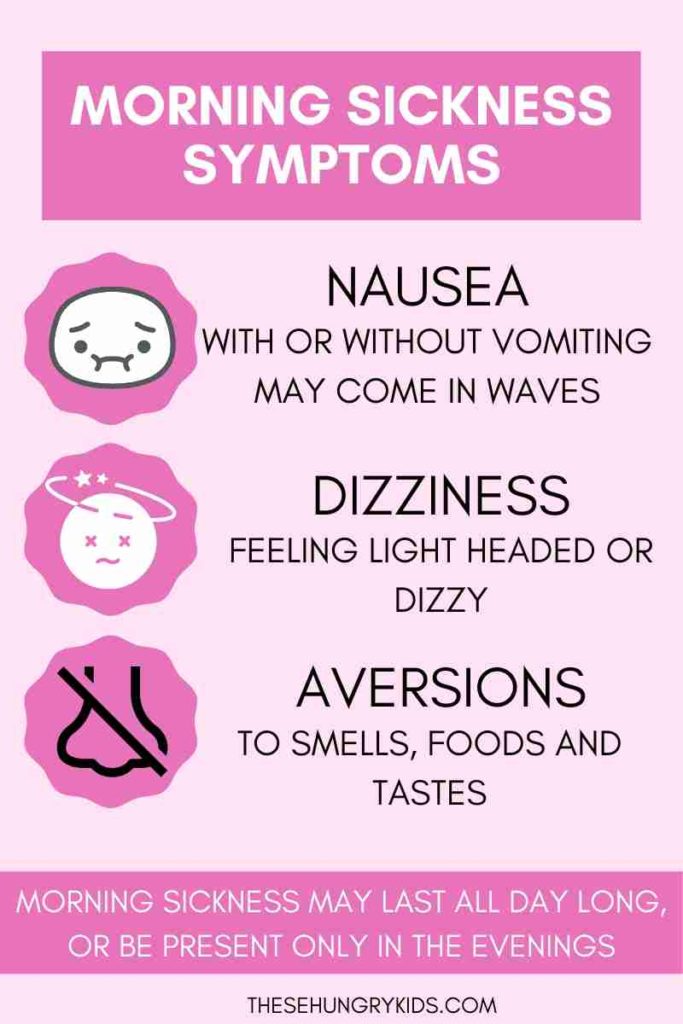Nausea, with or without vomiting, is one of the most common first trimester symptoms. It’s often referred to as morning sickness, though you may experience it at any point of the day.
The nausea and vomiting associated with the first trimester is believed to be due to the changing hormones. Let’s face it, growing a human is hard work!
It’s normal for some women to never experience morning sickness, while others feel sick and nauseous their whole pregnancy. Many believe that nausea during the first trimester is a “good sign” of fetal growth, though it’s most certainly not a definitive sign that everything is going well.

As a labor and delivery nurse, I have cared for many patients with morning sickness. While it is often a temporary discomfort, it is still very disruptive to day to day life! Fortunately there are some things you can try to help ease morning sickness (or all day sickness!)
Disclaimer: this post is meant for entertainment purposes only, and is not intended to treat or diagnose any individual that may be reading this post. Although I am a nurse, I am not your nurse and I am not treating or diagnosing any medical concerns you may have. Please consult with your personal medical provider with any questions or concerns you have regarding your health. Always consult with your provider before starting any form of treatment or therapy. Please see my Disclosure Policy for more information. This post contains affiliate links for your convenience. That means that if a purchase is made using the links on this post, I may earn a small commission at no additional cost to you. As an Amazon Affiliate, I earn from qualifying purchases. Thank you!
Morning sickness symptoms:
Morning sickness is how many people refer to the sick, queasy feeling that is common during the first trimester.
The name “morning sickness” can be misleading, as it can often last all day long or only at night.
Common symptoms
- Nausea, with or without vomiting
- Feeling lightheaded or dizzy
- Sensitivity to smells
- Food aversions or cravings
- Nausea that may come in waves

When does morning sickness start?
Many women experience morning sickness around the 6th week of pregnancy. It typically begins before week 9.
However, morning sickness can start at any point. It’s most common during the first trimester, which lasts until the end of week 12.
How long does morning sickness last?
Typically, once the placenta starts functioning and sustaining the baby, morning sickness starts to go away.
Often by the end of the first trimester, morning sickness has gone away.
It can also be very common to have days where you don’t experience nausea or vomiting, and then have days where you do feel sick and nauseous.
My personal experience
Personally, I experienced morning sickness (well, really all day sickness) with all three of my pregnancies. For me, it started during the fifth week, and lasted through the first trimester. By week 13, I was feeling much better!
With all three of my pregnancies, I started feeling some relief around weeks 9 or 10. By that point, the nausea wasn’t a daily occurrence. It’s easy to panic and think something is wrong when you start feeling well, but it is often a normal part of pregnancy. Sometimes morning sickness goes away as quickly as it has started.
What helps with morning sickness
There are many things to try to help alleviate morning sickness! Try a few out, and see what works best for you.
Every mom you’ll as has some sort of trick or remedy to help morning sickness. Ask around and see what you can find!
Related: Morning Sickness Remedies For the Desperate Mom-to-Be
Best tips to help morning sickness:
Eating small, frequent meals with plenty of water may help keep the nausea at bay.
If your nausea is mostly in the mornings, eating a few saltines, a granola bar, or graham crackers before you get out of bed may make the morning easier.
Ginger ale, ginger tea, or ginger lozenges have been known to help. Additionally, some women report that peppermint tea helps settle their stomach.
If you’re experiencing a lot of heartburn or indigestion, drinking a cup or two of this tea daily may help!
Sea bands may also be useful. These bracelets work by putting pressure on a pressure point in your wrist to alleviate nausea.
Sour candies and peppermint gum and mints are a good thing to keep on hand when the nausea starts.
Try sucking on Preggie Pops! They’re sour lozenges that also have vitamin B6, which may help nausea. These helped me tremendously in my second pregnancy.

Some women notice that their nausea is worse after taking their prenatal vitamins. If that’s the case for you, try taking your prenatal vitamins at night, or ask your doctor for a recommendation for a different brand.
Ask your doctor about starting a medication to help your morning sickness. A combination of B6 and Unisom has been known to help, as well as antiemetics, such as ondansetron.
Stay hydrated! Carry a large water bottle with you and sip throughout the day. Sipping on a sports drink throughout the day may help you stay hydrated and give you some sugar to feel energized.
Eat what you can, when you can. If all you can stomach is a few bites of toast, that’s better than nothing! You can focus on your nutrition when your sickness is better.
Avoid spicy food and acidic foods.
Get lots of rest! This is a tricky one, especially if you have other children to care for! But frequent breaks and rests can help you shake that weak feeling that often comes with morning sickness.
Ask for help! If cooking dinner sends you running to the bathroom, or the cleaner you use on the toilets is making you queasy, ask your partner or a friend to lend you a hand. It won’t last forever, so don’t feel bad asking for support.

What is extreme morning sickness?
There are some cases when morning sickness becomes too extreme. This is the case with something called hyperemesis gravidarum.
With hyperemesis gravidarum, the nausea and vomiting is so extreme it may cause:
- severe weight loss
- dehydration
- electrolyte imbalances
- fainting or dizziness
- confusion
- low blood pressure and/or rapid heart rate
- extreme fatigue
- and more…
Hyperemesis gravidarum is diagnosed by your provider, and may require treatments. Treatment may include something like medications and bedrest, or it may include an inpatient hospital stay for IV fluids or nutritional support.
Please consult with your physician if you are concerned that you may be experiencing hyperemesis gravidarum, or if you are concerned your morning sickness is becoming extreme.
If you’re currently experiencing morning sickness, take comfort in knowing it won’t last forever!
And it’s completely worth it! The darling little person you’re growing will make you forget that morning sickness ever happened.
Do you have any other tips for morning sickness? Leave them in the comments below and help another mama out!
Don’t forget to join my email list, follow me on Facebook, Instagram and Pinterest! Let’s be friends 🙂

